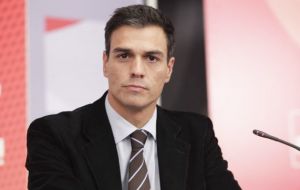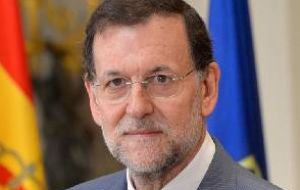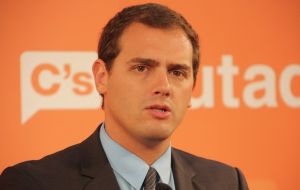MercoPress. South Atlantic News Agency
Socialists reject Rajoy's offer to join a PP government, but all parties want to avoid new elections in two months
 “We were clear: we will vote against the continuity of the Popular Party at the helm of the government, with Mariano Rajoy as prime minister,” Sanchez said
“We were clear: we will vote against the continuity of the Popular Party at the helm of the government, with Mariano Rajoy as prime minister,” Sanchez said  However he did not completely close the door on the Popular Party -- he did not say if the Socialists would support the party if Rajoy were to step down as leader.
However he did not completely close the door on the Popular Party -- he did not say if the Socialists would support the party if Rajoy were to step down as leader.  Ciudadanos leader Rivera said Socialists should be “responsible” and allow the Popular Party to govern in a minority to avoid early elections
Ciudadanos leader Rivera said Socialists should be “responsible” and allow the Popular Party to govern in a minority to avoid early elections Spanish Prime Minister Mariano Rajoy suffered a first major setback in his bid to stay in office as the Socialists refused Wednesday to back his attempt to form a new government following an inconclusive general election. Rajoy's conservative Popular Party won the most ballots in Sunday's vote but lost its absolute majority in the 350-seat lower house of parliament, taking just 123.
The opposition Socialists won 90 seats, followed by the far-left Podemos with 69 seats and the centre-right Ciudadanos with 40.
Rajoy in January will face a vote of confidence on whether he can stay on as leader of the government. In a first vote he needs to get the backing of more than half of 350 lawmakers in the assembly. If he falls short a second vote will be held 48 hours later with a lower bar to success -- he would just need to get more votes for than against him that time around.
That means if Ciudadanos and the Socialists were to abstain from voting in the second vote Rajoy would be able to get re-elected. Ciudadanos, which shares many of the Popular Party's economic policies, has said it will abstain.
But the leader of the Socialists, Pedro Sanchez, said Wednesday his party would not support any effort by Rajoy to stay in power, and anticipated that his party does not want to force Spain to another round of elections in two months time.
“We were clear: we will vote against the continuity of the Popular Party at the helm of the government, with Mariano Rajoy as prime minister,” he told a news conference after holding talks with Rajoy for the first time since the election.
Sanchez did not completely close the door on the Popular Party -- he did not say if the Socialists would support the party if Rajoy were to step down as leader.
The Socialist leader reiterated that the Popular Party should be the first to try to form a government since it won the most votes. But he said if the party failed, his formation would “explore all options for there to be a government of change”.
With leftwing parties holding the balance of power in the new parliament, the Socialists could form a government by joining forces with Podemos and other smaller nationalist forces. That outcome would mirror events in neighboring Portugal where the ruling conservatives won an October election but fell to a Socialist government backed by leftist parties just days later.
Under Spanish law, the new parliament must reconvene by January 13. Lawmakers have two months from the date of the first vote of confidence to elect a new government. If they fail new elections must be held.
“It is just a first round. We are only at the beginning of the process,” Fernando Martinez-Maillo, a top Popular Party official, told reporters after Rajoy's meeting with Sanchez.
Political analyst Nacho Martin Blanco said he believed the Socialists would “end up allowing the Popular Party to govern to avoid fresh elections which would see the Popular Party boost its score as it would recoup votes lost to Ciudadanos and to those who abstained.”
Rajoy will on Monday meet with the leader of Ciudadanos, Albert Rivera, and the leader of Podemos, Pablo Iglesias.
Rivera called for negotiations between his formation and the Popular Party and the Socialists to enable a stable government.
He said the Socialists should be “responsible” and allow the Popular Party to govern in a minority to avoid early elections and he warned the party against trying to form a government with Podemos.
Podemos is the only national party to back an independence referendum in the wealthy northeastern region of Catalonia and it ran in a coalition with nationalist platforms in Catalonia, Valencia on the Mediterranean coast and the northwestern region of Galicia.
“Podemos has excluded itself from the defense of the unity of Spain,” Rivera said.
Podemos's number two Inigo Errejon defended the party's support for a referendum in Catalonia, saying in a TV interview that it is “a proposal for Catalonia to remain in Spain”.




Top Comments
Disclaimer & comment rulesCommenting for this story is now closed.
If you have a Facebook account, become a fan and comment on our Facebook Page!